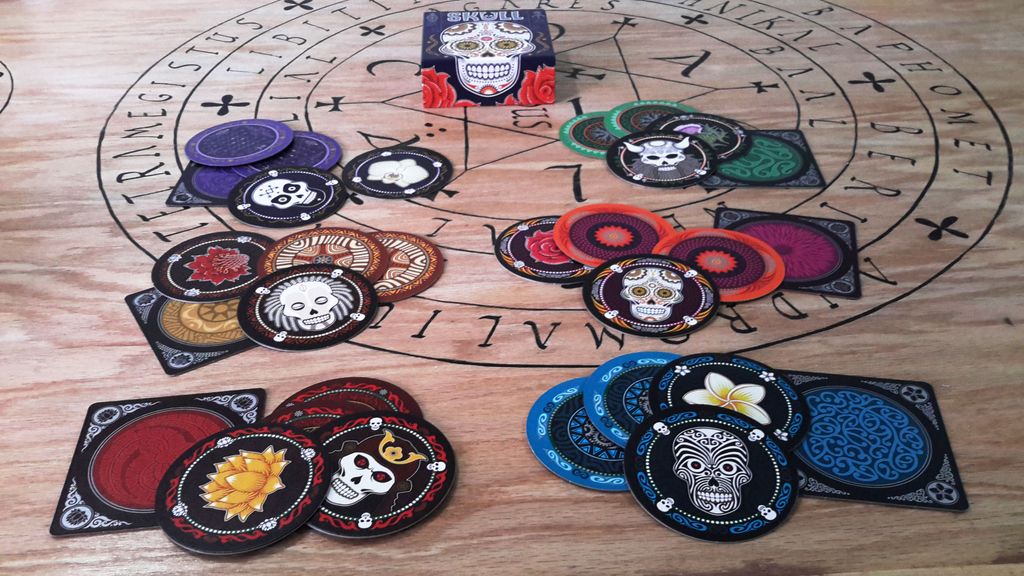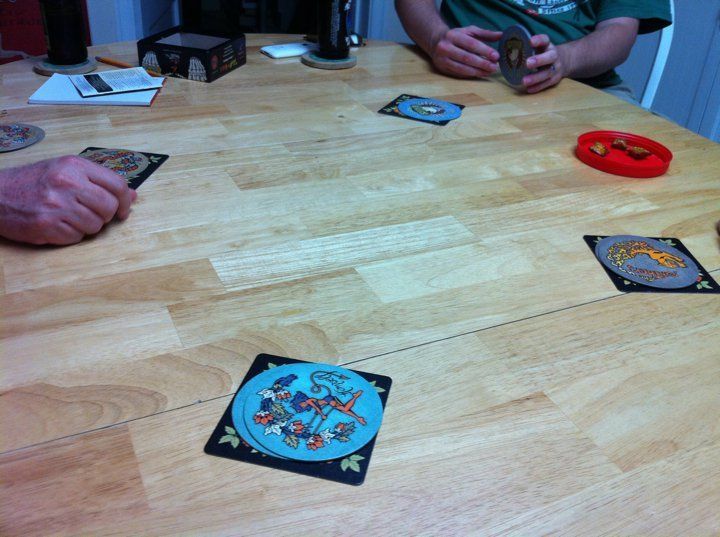Overview
Welcome to the world of ‘Skull‘, the game where bluffing and trepidation reign supreme. Here is a detailed review exploring what makes this deceptively simple yet enthralling game a captivating experience for players of all levels. We’re diving into the heart of Skull’s core mechanics, assessing how these elements contribute to its ever-evolving atmosphere of tension and anticipation. So, join me as I recount moments laden with playful deceit and strategic foresight that not only testify to Skull’s charm but also underscore the finesse needed to claim victory.
How It Plays
Skull is an elegantly simple game with a deceptively deep layer of strategy. In this game, players bluff and push their luck to outsmart their opponents.
Setting Up
To set up, each player receives a set of four coasters, three with flowers and one with a skull. These are kept secret, placed face-down in front of each player. The game begins once every player has their coasters arranged.
Gameplay
During a player’s turn, they choose to either place a coaster down or start a challenge. The tension rises as players try to bluff their way by placing down skulls or flowers, guessing when to push the game into a reveal phase. It’s a psychological tug-of-war with each player decision.
Winning the Game
A player wins by successfully completing two challenges, requiring the right mix of risk-taking and opponent reading. Guess correctly and you earn a point, guess where a skull is hiding, and your chances take a tumble. Victory goes to the bold, skilled in the arts of deception and intuition.
Want to know more? Read our extensive strategy guide for Skull.
The Intrigue of Deception
In any Skull review, it’s impossible not to highlight the riveting dance of bluff and double bluff. Recently, during a games night, Skull hit the table. As we transitioned into the game’s heart, something fascinating unfolded. The Bluffing Ballet One discerning friend, typically reserved, transformed, masterfully shrouding their intentions beneath layers of nonchalance. Player Psychology Dynamics With each round, our table’s dynamics gyrated with tension. We started second-guessing not only our actions but also everyone else’s motives. This psychological play is Skull’s tour de force—simple in design yet complex in human interaction. In our group, we still reminisce about those nail-biting moments.
Naturally, as the intensity waxes and wanes, game length and pacing inevitably synergize with these heartfelt strategies.

Thrilling Races Against Time in Skull
Playing Skull always feels like a speedy adventure. Each round’s inevitable rush was markedly prominent in one particular session that sticks in my memory. Despite initially just killing time before dinner, we were quickly lulled into a delicate dance of twists and turns as the minutes sailed by.
Accelerated Rounds, Adrenalized Hearts
Oh, the beauty of Skull’s brevity! The snappy pacing ensures that players remain on their toes. Adrenaline courses as the simple yet unpredictable nature of the game intertwines spectacularly, crafting a harmony between pace and suspense that captures everyone entirely.
Never a Dull Moment
Sequences of bluff, challenge, and reveal cascade at an almost cinematic tempo, ensuring ongoing engagement. Elegantly, the game’s conclusion looms just when the excitement hits its peak, leaving players craving another round. Very much like Skull itself, I must elegantly segue to dissecting the brilliance of its rules in simplicity, promising another layer of charm.

Mastering the Rules of Revelation
Clearly stating rules lays the foundation for any good board game. When I reflect on my Skull sessions for the review, introducing new players to its rules was a breeze – within minutes, we delved into play. Likewise, rule disputes were rare. It’s that ease which swiftly moves games from shelf to table.
Facilitating Fun
Unlike games fraught with cumbersome rulebooks, Skull epitomizes accessibility. This ease bonds players – there’s no apprehension or extended learning ramps, allowing us to share laughs almost instantly. It’s this straightforwardness that heralds the return to basics in contemporary board gaming.
No Rulebook Headaches
Finding a game that strikes that balance, marrying simplicity with engaging play, is a treasure. My verdict? Skull satisfies, inviting quick comprehension and repeated play. I heartily recommend it to anyone seeking casual, competitive fun.

Conclusion
As we round out this review of Skull, it’s clear that the game stands out for its elegant simplicity and thrilling player dynamics. From the well-paced rounds that keep everyone on their toes, to the satisfying blend of anticipation and risk that’s woven into every bluff, Skull hits the sweet spot of being both accessible to newcomers and deeply engaging for veteran players. Whether you’re looking for a spirited opener for game night, a quick filler between heavier strategy games, or just a fun way to challenge your friends to a duel of wits, Skull is a game I wholeheartedly recommend.




